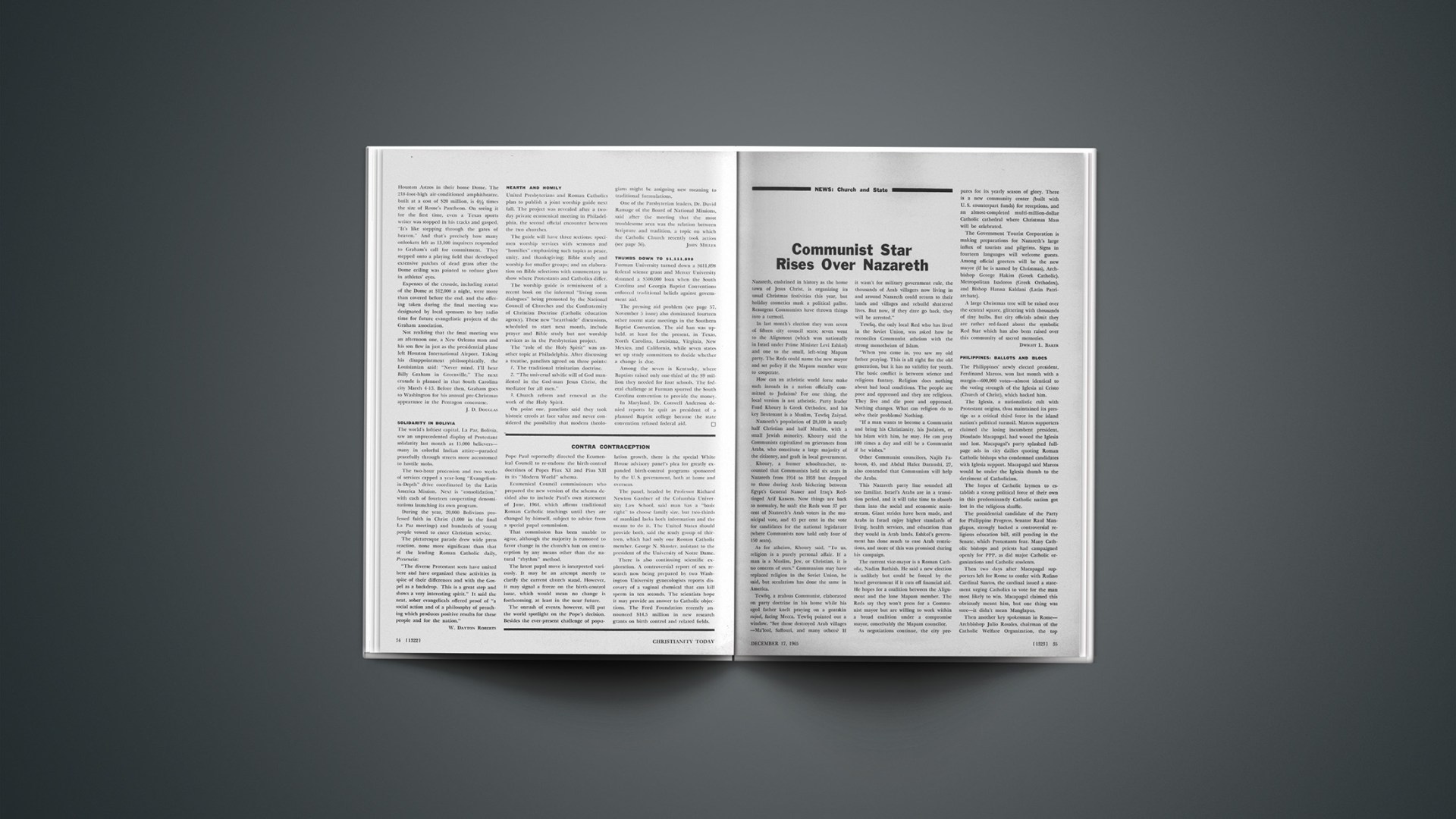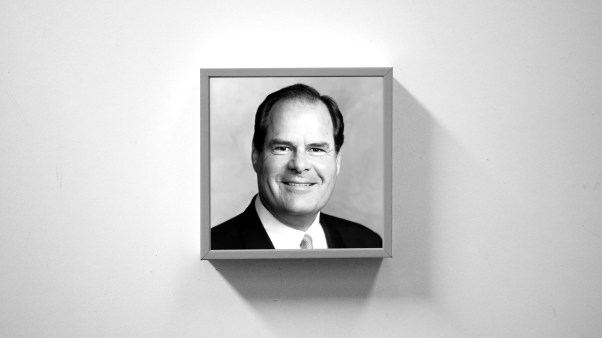Nazareth, enshrined in history as the home town of Jesus Christ, is organizing its usual Christmas festivities this year, but holiday cosmetics mask a political pallor. Resurgent Communists have thrown things into a turmoil.
In last month’s election they won seven of fifteen city council seats; seven went to the Alignment (which won nationally in Israel under Prime Minister Levi Eshkol) and one to the small, left-wing Mapam party. The Reds could name the new mayor and set policy if the Mapam member were to cooperate.
How can an atheistic world force make such inroads in a nation officially committed to Judaism? For one thing, the local version is not atheistic. Party leader Fuad Khoury is Greek Orthodox, and his key lieutenant is a Muslim, Tewfiq Zaiyad.
Nazareth’s population of 28,100 is nearly half Christian and half Muslim, with a small Jewish minority. Khoury said the Communists capitalized on grievances from Arabs, who constitute a large majority of the citizenry, and graft in local government.
Khoury, a former schoolteacher, recounted that Communists held six seats in Nazareth from 1954 to 1959 but dropped to three during Arab bickering between Egypt’s General Nasser and Iraq’s Red-tinged Arif Kassem. Now things are back to normalcy, he said: the Reds won 37 per cent of Nazareth’s Arab voters in the municipal vote, and 45 per cent in the vote for candidates for the national legislature (where Communists now hold only four of 150 seats).
As for atheism, Khoury said, “To us, religion is a purely personal affair. If a man is a Muslim, Jew, or Christian, it is no concern of ours.” Communism may have replaced religion in the Soviet Union, he said, but secularism has done the same in America.
Tewfiq, a zealous Communist, elaborated on party doctrine in his home while his aged father knelt praying on a goatskin sujad, facing Mecca. Tewfiq pointed out a window. “See those destroyed Arab villages—Ma’lool, Saffouri, and many others? If it wasn’t for military government rule, the thousands of Arab villagers now living in and around Nazareth could return to their lands and villages and rebuild shattered lives. But now, if they dare go back, they will be arrested.”
Tewfiq, the only local Red who has lived in the Soviet Union, was asked how he reconciles Communist atheism with the strong monotheism of Islam.
“When you came in, you saw my old father praying. This is all right for the old generation, but it has no validity for youth. The basic conflict is between science and religious fantasy. Religion does nothing about bad local conditions. The people are poor and oppressed and they are religious. They live and die poor and oppressed. Nothing changes. What can religion do to solve their problems? Nothing.
“If a man wants to become a Communist and bring his Christianity, his Judaism, or his Islam with him, he may. He can pray 100 times a day and still be a Communist if he wishes.”
Other Communist councilors, Najib Fahoum, 45, and Abdul Hafez Daraushi, 27, also contended that Communism will help the Arabs.
This Nazareth party line sounded all too familiar. Israel’s Arabs are in a transition period, and it will take time to absorb them into the social and economic mainstream. Giant strides have been made, and Arabs in Israel enjoy higher standards of living, health services, and education than they would in Arab lands. Eshkol’s government has done much to ease Arab restrictions, and more of this was promised during his campaign.
The current vice-mayor is a Roman Catholic, Nadim Bathish. He said a new election is unlikely but could be forced by the Israel government if it cuts off financial aid. He hopes for a coalition between the Alignment and the lone Mapam member. The Reds say they won’t press for a Communist mayor but are willing to work within a broad coalition under a compromise mayor, conceivably the Mapam councifor.
As negotiations continue, the city prepares for its yearly season of glory. There is a new community center (built with U. S. counterpart funds) for receptions, and an almost-completed multi-million-dollar Catholic cathedral where Christmas Mass will be celebrated.
The Government Tourist Corporation is making preparations for Nazareth’s large influx of tourists and pilgrims. Signs in fourteen languages will welcome guests. Among official greeters will be the new mayor (if he is named by Christmas), Archbishop George Hakim (Greek Catholic), Metropolitan Isadoras (Greek Orthodox), and Bishop Hanna Kaldani (Latin Patriarehate).
A large Christmas tree will be raised over the central square, glittering with thousands of tiny bulbs. But city officials admit they are rather red-faced about the symbolic Red Star which has also been raised over this community of sacred memories.
Philippines: Ballots And Blocs
The Philippines’ newly elected president, Ferdinand Marcos, won last month with a margin—600,000 votes—almost identical to the voting strength of the Iglesia ni Cristo (Church of Christ), which backed him.
The Iglesia, a nationalistic cult with Protestant origins, thus maintained its prestige as a critical third force in the island nation’s political turmoil. Marcos supporters claimed the losing incumbent president, Diosdado Macapagal, had wooed the Iglesia and lost. Macapagal’s party splashed full-page ads in city dailies quoting Roman Catholic bishops who condemned candidates with Iglesia support. Macapagal said Marcos would be under the Iglesia thumb to the detriment of Catholicism.
The hopes of Catholic laymen to establish a strong political force of their own in this predominantly Catholic nation got lost in the religious shuffle.
The presidential candidate of the Party for Philippine Progress, Senator Raul Man-glapus, strongly backed a controversial religious education bill, still pending in the Senate, which Protestants fear. Many Catholic bishops and priests had campaigned openly for PPP, as did major Catholic organizations and Catholic students.
Then two days after Macapagal supporters left for Rome to confer with Rufino Cardinal Santos, the cardinal issued a statement urging Catholics to vote for the man most likely to win. Macapagal claimed this obviously meant him, but one thing was sure—it didn’t mean Manglapus.
Then another key spokesman in Rome—Archbishop Julio Rosales, chairman of the Catholic Welfare Organization, the top governing body of the national church—denied that the hierarchy was behind anyone. Some detected a split among top leaders. Many Catholics apparently thought the cardinal had deserted the PPP for political expediency and supported Marcos (also a Catholic) in protest.
An eloquent Protestant protest won journalistic praise. Dr. Enrique C. Sobrepeña, executive secretary of the United Church of Christ, said that “the church … must not meddle in partisan politics, nor interfere with government affairs.”
Besides provocative religious controversy, this fall’s campaign produced the most vicious propaganda ever seen. And there were numerous political murders—eight on election day—although observers said this year’s election was the least bloody since Liberation.
Life magazine, in a recent discussion of the campaign, reported that Marcos himself was convicted of a political murder in 1935 but was later acquitted on appeal. The same article documented the deep moral challenges the new president will face, including crime, pork-barrel politics, and corrupt legislators.
EUSTAQUIO RVMIIATOS, JR.
Going For Gold?
This has been a good year for rumpus-loving Athenians, thanks to a tottering government, a scarcely more stable monarchy, and the tireless mischief-making of Greek Communists, who are currently exploiting a new crisis. Thirty-six out of fifty-one Orthodox bishops, defying the law that decrees the promoting of archimandrites (unmarried priests) to Greece’s fifteen vacant dioceses, have been appointing bishops instead. At present (with a few exceptions) a bishop must stay all his working life in one place, with no hope of transfer to a larger and wealthier see where taxes on christenings, marriages, and funerals would supplement his basic monthly income of $330.
A 700-man police guard turned out to prevent the rebel bishops from meeting in Athens Cathedral, and the prelates turned away amid cries of, “Is it Christ or gold you want?” Persisting, they sent men off to be instituted in different areas.
After some wavering, the 90-year-old primate, Archbishop Chrysostomos, decided he could not act against civil law and advised local authorities not to recognize the “new” bishops. Most newspapers also were hostile, with the capital’s Eleftheria referring to “a rebellion and a coup against the law and the state.” A special Orthodox Church committee headed by Chrysostomos is now studying a parliamentary bill that would reform regulations on the election, assignment, and financial support of bishops.










